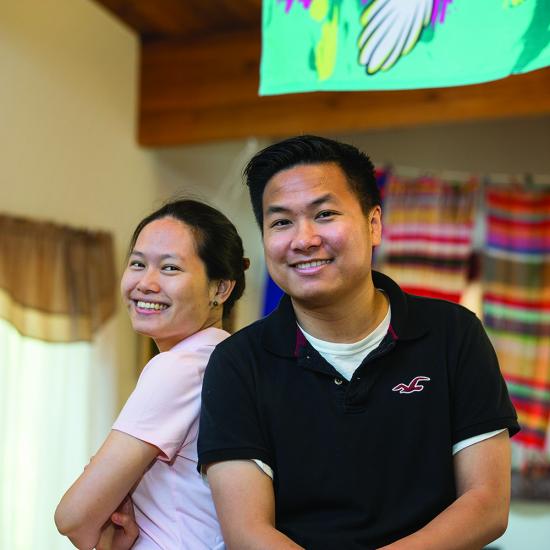Bilingual Volunteers Help Center for Social Healing Feel Like Home
On a recent Thursday, about 15 Vietnamese elders gathered at Wilder’s Center for Social Healing to learn about smartphones. Many of the elders had their own phones, but they had questions about how to use them. They received help from two volunteers: a millennial college student and a recent immigrant to Saint Paul.
Harrison Nguyen, a 21-year-old college student, and Nguyen Tran, who recently moved here from Vietnam, were ready to help. With a laptop and a projector, they provided a cellphone tutorial in Vietnamese. The elders listened intently and asked questions, sometimes holding up their phones.
Nguyen and Tran are part of a small but growing group of bilingual and bicultural volunteers at the Wilder Foundation. About 35 of the foundation’s 1,200 volunteers list themselves as bilingual, with Hmong, French, Spanish, and Somali as the most common languages.
Bilingual volunteers are valued at Wilder because they enhance the foundation’s ability to connect with underserved cultural communities. Volunteers with language skills can help create a welcoming environment, can help members, participants, and clients throughout Wilder feel comfortable asking questions, and can help people feel like their voice is being heard.
Volunteers Create a Community Feel at the Center
“Volunteers normalize the experience that members have here,” says Paul Sinclair, Director of the Center for Social Healing, which focuses on alternative ways of healing, learning, and community building for members of four Southeast Asian communities who face barriers to adjusting to life in the United States. “Members are used to being around doctors, social workers, and others who are helping them in a professional capacity, but volunteers are just big-hearted people. They help the Center feel like a community.”
Nguyen, a psychology and communication major at the University of Minnesota, was looking for a way to help out and explore potential career paths when he began volunteering at the Center. He expected to walk into a clinic, but instead, “you come in and it feels like a little festival,” he said.
Nguyen takes part in the regular activities at the Center. He has translated for members during acupuncture sessions. He has accompanied members on field trips, including an excursion on the St. Croix River. He strives to help members have positive social interactions.
Through his intergenerational volunteer work, he has gained a deeper understanding of his own culture. Nguyen was born in Vietnam and grew up in Minnesota, speaking Vietnamese at home. “I feel like I’ve learned more about my culture than I had growing up (in White Bear Lake),” he said. “People here have amazing stories.” As a bonus, he says his Vietnamese has improved.
An Enriching, Emotional Experience for Volunteers
Fellow volunteer Tran moved to the United States from Vietnam in early 2016 to be with her husband. Tran said she received a lot of help when she first arrived, and now she wants to give back.
She has noticed that Vietnamese elders can have difficulties maintaining social connections because of language and cultural barriers. But at the Center, she sees people who are open to new activities and experiences. “The most important thing I think I can learn is the way people here respect people who have a challenge—mental or physical,” Tran says.
Nguyen and Tran are part of a team of social work interns, medical students and volunteers who bring a wide range of skills and experience to the Center. “It becomes an enriching experience very quickly,” Sinclair says. “Volunteers get connected at a more visceral, emotional level.”
